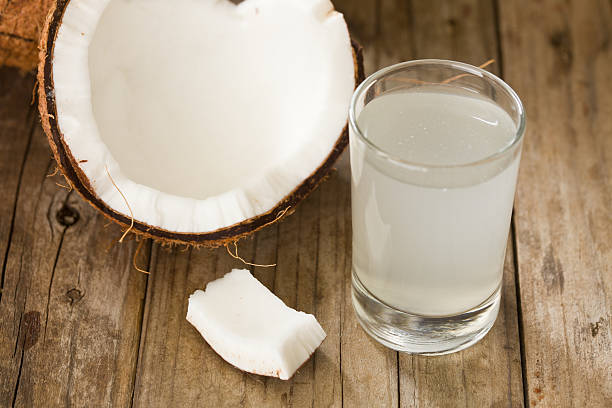Coconut water is a popular drink that has gained a reputation for being a natural way to increase milk supply in breastfeeding mothers. While there is no scientific evidence to support this claim, many women have reported positive results after incorporating coconut water into their diet. However, the question remains: How Much Coconut Water Should I Drink To Boost Milk Supply?
According to experts, there is no set amount of coconut water that one should consume to increase milk supply. The amount of coconut water that a breastfeeding mother should and how much coconut water should i drink to boost milk supply, depends on various factors, including her body weight, hydration levels, and overall health. It is recommended that she consult with her healthcare provider to determine how much coconut water is safe for her to consume.
It is important to note that while coconut water may have some nutritional benefits, it should not be relied upon as the sole means of increasing breast milk. Breastfeeding mothers should prioritize a healthy, balanced diet and stay hydrated by drinking plenty of water. Additionally, they may consider incorporating other lactation-promoting foods and drinks, such as oatmeal, fenugreek tea, and fennel seeds, into their diet.
Understanding the Connection Between Hydration and Lactation

Breast milk is the primary source of nutrition for infants, and it is essential to maintain an adequate supply of it. One of the factors that can impact breast milk production is hydration. Therefore, it is crucial to understand the relationship between hydration and lactation.
Role of Hydration in Breast Milk Supply
Breast milk is mostly composed of water, and the body needs to be adequately hydrated to produce enough milk. Dehydration can affect milk production, leading to a decrease in milk supply. A study published in the Journal of Human Lactation found that mild dehydration can reduce milk production. Therefore, it is essential to drink enough fluids to maintain a healthy breast milk supply.
Importance of Staying Hydrated While Breastfeeding
Staying hydrated while breastfeeding is crucial for both the mother and the baby. Adequate hydration can help prevent constipation, reduce the risk of urinary tract infections, and improve the overall health of the mother. It can also help the baby stay hydrated, especially during hot weather.
The American Academy of Pediatrics recommends that breastfeeding mothers drink enough fluids to satisfy their thirst and produce pale urine. However, there is no specific amount of water or other fluids that a breastfeeding mother needs to drink. The amount of fluids required can vary based on several factors, including body weight, activity level, climate, and diet.
In addition to water, other fluids such as coconut water can be beneficial for breastfeeding mothers. Coconut water is a low-calorie, low-sugar, and highly nutritive beverage that is high in natural electrolytes. It can help rehydrate the body and provide essential nutrients that can aid in breast milk production.
In summary, adequate hydration is crucial for maintaining a healthy milk supply while breastfeeding. Mothers should drink enough fluids to satisfy their thirst and produce breast milk without pale urine. Coconut water can be a healthy and nutritious option to stay hydrated and boost milk supply.
Coconut Water: A Nutritious Drink

Coconut water is a popular drink that is widely consumed for its potential health benefits. It is a clear liquid that is found inside young, green coconuts. Many people believe that drinking coconut water can help boost breast milk supply in lactating mothers. In this section, we will discuss the nutritional value of coconut water and how it compares to coconut milk.
Nutritional Value of Coconut Water
Coconut water is a nutritious drink that is low in calories and fat. According to the Mayo Clinic, unflavored coconut water is low in sugar and calories, making it a healthy alternative to other sugary drinks. One cup (240 ml) of coconut water contains the following nutrients:
- Calories: 46
- Total Fat: 0.5 g
- Sodium: 252 mg
- Potassium: 600 mg
- Total Carbohydrates: 9 g
- Dietary Fiber: 3 g
- Sugar: 6 g
- Protein: 2 g
Coconut water is also a good source of several essential nutrients, including vitamin C, magnesium, and calcium. It is also rich in electrolytes, which can help replenish fluids lost during exercise or other physical activities.
Coconut Water Vs Coconut Milk
Coconut, plain coconut water, and coconut milk are two different beverages that are often confused with each other. While coconut water is the clear liquid found inside young coconuts, coconut milk is made by blending coconut meat with water.
Coconut milk is much higher in calories and fat than coconut water. One cup (240 ml) of coconut milk contains the following nutrients:
- Calories: 552
- Total Fat: 57 g
- Sodium: 36 mg
- Potassium: 497 mg
- Total Carbohydrates: 13 g
- Dietary Fiber: 5 g
- Sugar: 5 g
- Protein: 5 g
Coconut milk is also a good source of several essential nutrients, including iron, phosphorus, and manganese. However, it is not as low in calories and sugar as coconut water.
In conclusion, coconut water is a nutritious drink that can be a healthy alternative to other sugary drinks. It is low in calories and fat and rich in essential nutrients, including potassium, magnesium, and calcium. While coconut milk is also a good source of nutrients, it is much higher in calories and fat than coconut water.
Benefits of Coconut Water for Lactating Mothers

Coconut water is a popular drink among lactating mothers. It is a natural and refreshing drink that is rich in nutrients and minerals. Here are some of the benefits of coconut water for lactating mothers.
Boosting Milk Supply
One of the most significant benefits of coconut water for lactating mothers is its ability to have more breast milk. Coconut water is rich in electrolytes, which help to keep the body hydrated. Hydration is essential for milk production, and drinking coconut water can help to increase milk supply.
Enhancing Immunity
Coconut water is also known to enhance immunity. It contains lauric acid, which has antimicrobial and antiviral properties that help to boost the immune system. This is particularly important for lactating mothers, as they need to maintain good health to produce high-quality milk.
Improving Digestion
Coconut water is also beneficial for improving digestion. It contains enzymes that aid in the digestion of food, which can help to prevent digestive issues such as constipation and bloating. This is particularly important for lactating mothers, as they need to maintain good digestive health to produce high-quality milk.
Maintaining Energy Levels
Lactating mothers need to maintain high energy levels to keep up with the demands of breastfeeding. Coconut water is a natural source of energy that can help to maintain energy levels. It contains natural sugars that provide a quick energy boost, as well as electrolytes that help to maintain energy levels throughout the day.
In conclusion, coconut water is a natural and refreshing drink that is rich in nutrients and minerals. It has many benefits for lactating mothers, including boosting milk supply, enhancing immunity, improving digestion, and maintaining energy levels.
Incorporating Coconut Water into Your Diet

Coconut water is a refreshing and nutritious drink that can help boost milk supply for breastfeeding mothers. Here are some simple and tasty ways to incorporate coconut water into your diet.
Coconut Water Smoothies
Smoothies are a great way to pack in nutrients and hydration. Adding coconut water to your lactation smoothies can not only boost milk supply but also provide essential vitamins and minerals. Here are some lactation smoothie recipes that use coconut water:
- Pineapple and Coconut Water Lactation Smoothie
- Mango and Coconut Water Lactation Smoothie
- Banana and Coconut Water Lactation Smoothie
To make these smoothies, simply blend the ingredients together and enjoy.
Coconut Water Based Drinks
Coconut water can be used as a base for a variety of sports drinks. Here are some ideas:
- Coconut Water Lemonade: Mix coconut water with lemon juice and sweetener of your choice for a refreshing summer drink.
- Coconut Water Iced Tea: Brew your favorite tea and add coconut water for a hydrating twist.
- Coconut Water Mocktail: Mix coconut water with your favorite fruit juice and garnish with fresh fruit for a healthy and delicious mocktail.
Coconut Water Supplements
If you’re not a fan of the taste of coconut water, you can still reap its benefits by taking coconut oil and water supplements. These supplements come in different forms, including capsules and powders. They are a convenient way to boost milk supply and hydration.
It’s important to note that while coconut water can be a helpful addition to a breastfeeding diet, it should not be relied on as the sole source of hydration. Drinking plenty of water is still essential for milk production and overall health.
In conclusion, incorporating coconut water into your diet can be a delicious and nutritious way to boost milk supply. Whether you prefer smoothies, drinks, or supplements, there are plenty of options young coconut you to choose from.
Precautions and Considerations

Understanding the Caloric Content
Coconut water is a low-calorie drink that can help boost milk supply in nursing mothers. One cup of coconut water contains approximately 46 calories, making it a healthy and nutritious option for both breastfeeding moms and mothers who want to stay hydrated while nursing their babies.
However, it is important for nursing moms to keep in mind that too much of anything can be harmful. It is recommended that nursing mothers limit their intake of coconut water to 1-2 cups per day to avoid consuming too many calories.
Choosing Between Fresh and Packaged Coconut Water
When it comes to choosing between fresh and packaged coconut water, there are a few things to consider. Fresh coconut water is considered the best option as it is free from preservatives and additives. However, it may not be easily available in all areas, and it can be more expensive than packaged coconut water.
Packaged coconut water is a convenient option that is readily available in most grocery stores. However, it is important to check the label for added sugars and preservatives. It is recommended to choose coconut products from a brand that is low in sugar and does not contain any additives.
Potential Side Effects
While coconut water is generally considered safe for nursing mothers, there are some potential side effects to be aware of. Drinking too much coconut water can cause diarrhea, which can lead to dehydration. It is recommended to limit intake to 1-2 cups per day.
Additionally, some people may be allergic to coconut water. If you experience any symptoms such as hives, itching, or difficulty breathing after drinking coconut water, it is important to seek medical attention immediately.
In conclusion, coconut water can be a healthy and nutritious option for nursing mothers who want to boost their milk supply. However, it is important to consume it in moderation and choose a brand that is low in sugar and does not contain any additives. If you experience any adverse reactions, it is important to seek medical attention immediately.
Alternatives to Coconut Water for Boosting Breast Milk

If you are not a fan of coconut water or cannot find it in your local store, don’t worry. There are other alternatives that can help increase milk production.
Lactation Teas

Lactation teas are a popular alternative to coconut water. These teas are made with herbs that are believed to boost milk supply. Some of the commonly used herbs in lactation teas include fenugreek, fennel, and blessed thistle. These herbs work by stimulating the production of prolactin, a hormone responsible for milk production.
When choosing a lactation tea, it is important to read the label carefully and check the ingredients. Some lactation teas contain caffeine, which can interfere with milk production. It is also important to note that lactation teas are not a substitute for a healthy diet and proper hydration.
Protein Shakes

Protein is an essential nutrient for milk production. If you are not getting enough protein in your diet, it can affect or increase your milk supply. Drinking protein shakes can help increase your protein intake and boost milk production.
When choosing a protein shake, look for one that is specifically designed for lactating mothers. These shakes are usually made with whey protein, which is easily digestible and has a high biological value. They may also contain other nutrients that are important for milk production, such as vitamins and minerals.
Fruit Juices

Fruit juices can also help increase milk production. Some fruits, such as papaya and apricots, are believed to have lactogenic properties. Drinking these juices can help stimulate milk production and provide your body more milk with essential nutrients.
When choosing a fruit juice, look for one that is low in sugar and free of additives. It is also important to note that fruit juices should not be used as a substitute for water or other hydrating fluids.
In conclusion, coconut water is not the only option for boosting milk supply. Lactation teas, protein shakes, and fruit juices are all viable alternatives. However, it is important to remember that these alternatives should be used in conjunction with a healthy diet and proper hydration for best results.
Conclusion

In conclusion, coconut water is a safe and nutritious drink for breastfeeding mothers. While there is no definitive data to support the claim that coconut water increases milk flow, it is a healthy alternative to sugary drinks.
Coconut water is rich in electrolytes, vitamins, and minerals that are beneficial for lactating mothers. It can help replenish lost fluids and nutrients, which is especially important during breastfeeding. Additionally, coconut water can help reduce inflammation and soreness in the body, which can be beneficial for postpartum recovery.
It is recommended as breastfeeding drinks that breastfeeding mothers consume at least 8-10 glasses of fluids per day to maintain hydration and support milk production. Coconut water can be a part of this fluid intake, but it should not be the sole source of hydration. Other healthy drinks such as water, herbal teas, and fresh juices should also be consumed to maintain a balanced diet.
Overall, coconut water is a healthy and safe beverage for breastfeeding mothers. While it may not directly increase milk supply, it can provide essential nutrients and support overall health during the postpartum period.
Also read: 12 Best Pacifiers for Breastfed Baby and Newborn 2023
Frequently Asked Questions

Can coconut water increase breast milk?
Coconut water is a natural way to keep breastfeeding mothers hydrated. It is packed with electrolytes, minerals, and nutrients that can help keep them hydrated and energized, which is important when they are breastfeeding. However, there is no scientific evidence to suggest that coconut water can increase breast milk supply. Drinking coconut water in moderation can be a healthy addition to a breastfeeding mother’s diet, but it should not be relied upon as a sole source of hydration or nutrition.
Best coconut water for breastfeeding
When choosing coconut water while breastfeeding, it is important to look for brands that are 100% natural and do not contain added sugars or preservatives. Some popular brands of coconut water that are safe for breastfeeding mothers include Vita Coco, Harmless Harvest, and Zico. It is also important to note that fresh coconut water is the best option, as it is less processed and contains more nutrients than packaged coconut water.
Coconut water vs coconut milk for breastfeeding
Coconut water and coconut milk are two different products with distinct nutritional profiles. Coconut milk is created by blending coconut meat with water, whereas coconut water is the clear liquid found inside a young, green coconut. Compared to coconut meat and milk, coconut water has fewer calories and fat but also fewer nutrients. Coconut milk can be used in place of dairy milk in cooking and baking since it is a wonderful source of healthful fats. Coconut milk and water can both be beneficial additions to a nursing mother’s diet, but they should only be used in moderation.
Coconut milk breastfeeding gas
Some breastfeeding mothers may experience gas or bloating after consuming coconut milk. This is because coconut milk contains high levels of fat, which can be difficult to digest for some people. If a breastfeeding mother experiences gas or bloating after consuming coconut milk, she may want to try reducing her intake or switching to a lower-fat alternative, such as almond milk.
Vita Coco coconut water breastfeeding
Vita Coco is a popular brand of coconut water that is safe for breastfeeding mothers to drink. It is 100% natural and does not contain added sugars or preservatives. Drinking Vita Coco coconut water in moderation can be a healthy addition to a breastfeeding mother’s diet, but it should not be relied upon as a sole source of hydration or nutrition.
What drinks help increase breast milk?
There are several drinks that can help increase breast milk supply, including water, herbal teas, and milk-based drinks such as cow’s milk, almond milk, and oat milk. It is important for breastfeeding mothers to stay hydrated and consume enough calories to support milk production. Drinking enough water and consuming a balanced diet can also help increase breast milk supply.


 PARENTING TIPS
PARENTING TIPS PREGNANCY
PREGNANCY BABY CARE
BABY CARE TODDLERS
TODDLERS TEENS
TEENS HEALTH CARE
HEALTH CARE ACTIVITIES & CRAFTS
ACTIVITIES & CRAFTS


